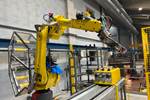CompoTech uses integrated loop technology to create high-performance mountain bike
CompoTech features its CDuro Epona mountain bike fitted with custom suspension forks, manufactured using its AFL winding and integrated loop technologies.
Epona CDuro mountain bike, developed for Enduro racing. Source (All Images) | CompoTech Plus spol. s r.o
CompoTech Plus spol. s r.o (Sušice, Czech Republic) develops automated carbon fiber laying (AFL) placement and winding technologies to manufacture high-performance carbon fiber-reinforced epoxy components and large structures. Using its R&D and design engineering resources, CompoTech has also developed a proprietary integrated loop technology (ILT) for producing continuous fiber joints that do not require any drilling or fixings.
CompoTech’s proprietary automated fiber winding, placement and joining technologies are demonstrated in its CDuro carbon fiber bike frame. The wound tubular frame components include ILT end joints; each section of the bike frame can be bonded together with no added weight from any fixings or loss of mechanical performance due to having to drill through any continuous carbon fibers. The ILT joints can also reduce overall assembly time and labor costs.
The latest version of the CDuro bike project, the CDuro Epona mountain bike, is fitted with custom design “Intend Carbonite” suspension forks, which are said to have much lighter, stiffer carbon fiber-reinforced epoxy fork tubes than existing aluminum design forks. These composite suspension forks are the result of a collaboration project between CompoTech and Intend Bicycle Components GmbH (Freiburg, Germany), a bicycle components manufacturer, to further improve the bike’s “extreme sports” performance.
For manufacturers looking to install in-house automated carbon fiber component production capabilities, CompoTech also offers customers turnkey automated fiber winding and filament placement machines; each custom-built automated machine comes with the patented advanced winding technologies as part of the package, which includes after-sales technical and produce development support.
Early prototype carbon fiber-reinforced epoxy components that make up the CDuro’s lightweight bike frame.
CompoTech’s winding technology, developed 30 years ago as a self-built filament winder with “true zero” degree axial fiber placement, was originally used for manufacturing high-performance whitewater sports paddle shafts. Today, six-axis FANUC robot integrations enable automated precision zero degree carbon fiber axial placement, often using pitch fibers, for manufacturing square carbon fiber epoxy-reinforced beams and tubes for industrial applications where high stiffness and natural frequency is required.
According to the company, parts produced by CompoTech provide enhanced mechanical properties, weight reduction (typically 25% less than steel), increased efficiency/productivity and reduced costs, with the added benefit of reducing a company’s carbon footprint from needing less energy consumption to run machines and production lines.
CompoTech has manufactured a variety of carbon fiber and carbon fiber-metal hybrid components, which have been custom designed and supplied to OEMs as alternative, lightweight, high-performance composite parts, with comparable mechanical properties to steel or aluminum. Examples of CompoTech manufactured parts which have been specified in preference to metal include composite beams, rotary shafts, spindles and tools for production machines and automated lines.
Related Content
-
PEEK vs. PEKK vs. PAEK and continuous compression molding
Suppliers of thermoplastics and carbon fiber chime in regarding PEEK vs. PEKK, and now PAEK, as well as in-situ consolidation — the supply chain for thermoplastic tape composites continues to evolve.
-
TU Munich develops cuboidal conformable tanks using carbon fiber composites for increased hydrogen storage
Flat tank enabling standard platform for BEV and FCEV uses thermoplastic and thermoset composites, overwrapped skeleton design in pursuit of 25% more H2 storage.
-
Bio-based acrylonitrile for carbon fiber manufacture
The quest for a sustainable source of acrylonitrile for carbon fiber manufacture has made the leap from the lab to the market.
















